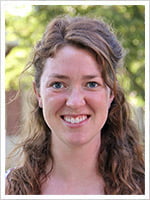Most people view food as something to be eaten. Most people fail to see the justice issues that stem from the food system. Access to food is a complex. People like Emily Johnson, 2014 Hastings College graduate, are driven by these issues, and making change within the food production, distribution and consumption system. This drive has led her to accept a fellowship position with the Emerson National Hunger Fellows program.
 Emily first heard about the fellowship from a supervisor at her summer internship with Nebraska Appleseed. Although she was not get accepted the first time she applied, she applied again after she had more gaining more work and volunteer experience.
Emily first heard about the fellowship from a supervisor at her summer internship with Nebraska Appleseed. Although she was not get accepted the first time she applied, she applied again after she had more gaining more work and volunteer experience.
Emily attributes landing the fellowship in part to Hastings College.
“The amount of engagement in social justice service, the various leadership opportunities and my academic pursuits at Hastings really fostered a comprehensive perspective on poverty and food insecurity related issues, which I think made my application more competitive,” she said. Emily appreciated her Hastings College professors, including Dr. Bob Amyot, Dr. Jean Heriot and Dr. Liz Frombgen, helping her with the interview process and giving her insights into her options.
According to its website, the Emerson National Hunger Fellows program, named for the late U.S. Representative Bill Emerson (R-MO) who was active on hunger issues while serving in Congress, promotes “social justice by training, inspiring, and sustaining leaders” and “supports diversity of local and national approaches to eliminate hunger, poverty, and social inequality.” Each year, 16-20 people from around the country are selected for a year-long program. For the first five months, the fellows are placed with a community-based organization. Then fellows gather in DC to share experiences. Additionally, they train to serve as anti-hunger and anti-poverty policy advocates and work in non-profits and government agencies. Once they complete their fellowship, participants will have experience working at local and national levels.
“I applied to the Emerson National Hunger Fellowship because I find that the program’s model of blending poverty alleviation, food insecurity and anti-racism is extremely essential in transforming national policy and programming into compassionate, realistic, and justice-rooted solutions,” said Emily. “I think the program will challenge me in several different ways, and I am so excited for the opportunity to engage in a community of like-minded social change leaders coming with a breadth of their own personal experiences.”
Emily sees herself returning to school for a Master’s of Public Policy or law degree. Ultimately, she wants to focus on shaping government responses to hunger and poverty. She would like to see the responses transformed from being cluttered with many social issues to being infused with more compassion and understanding.
She said, “It demands a critical, creative and holistic perspective, one that I find great satisfaction in cultivating throughout my personal, academic and professional life.”
